Microsoft Surface Pro Review
by Anand Lal Shimpi on February 5, 2013 9:00 PM ESTSurface Pro as a Tablet
If you can get over the bulk, Surface Pro is easily the fastest tablet on the market today. Apple has done a great job of making relatively slow hardware feel very fast with iOS, but Surface Pro brute forces its way to the top. Web pages load quicker than on any ARM based tablet and multitasking is just awesome on the device. This is where the power of Intel’s Core microarchitecture really comes into play.
Since the introduction of the 3rd generation iPad with Retina Display several folks have pointed out to me that UI frame rate isn’t always so smooth on the device. I personally never noticed because I found that most of the competition was even worse, so it always seemed relatively smooth to me. After playing with Surface Pro however and going back to even the 4th gen iPad all of the sudden frame rate stutters are much more noticeable. Playing around with Bing maps on Surface Pro vs. RT is like night and day. Even if you compare scrolling and zoom performance to native iOS maps on the iPad 4, Surface Pro wins out.
Scrolling in web pages, application install time, file copy time, everything is just significantly faster on Surface Pro than on any competing tablet. Oh, and it boots (from full power off) in less than 10 seconds. It’s really the combination of the great CPU performance and fast SSD that deliver the responsiveness of the Surface Pro.
We’re still lacking good cross-platform performance tests, but there are a few browser based benchmarks that I can use to highlight just how much faster Surface Pro is compared to anything ARM based on the market today:
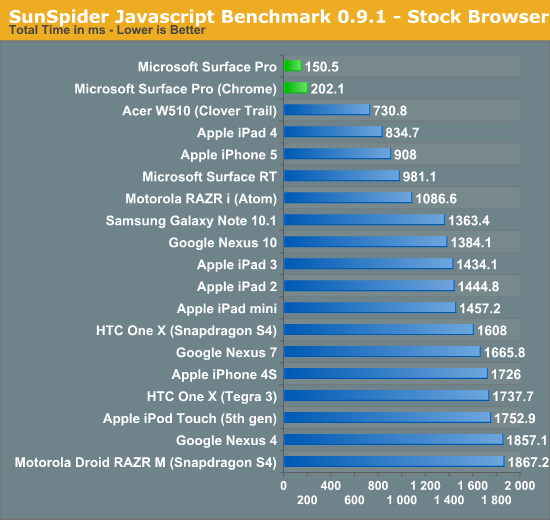
SunSpider is our tried and true quick js benchmark, and here we see huge scaling as we move to Intel's Core i5. Regardless of browser used you're seeing a significant improvement in performance that directly translates to faster web page load times.
Moving on we have Kraken, a seriously heavy javascript benchmark built by Mozilla. Kraken focuses on forward looking applications that are potentially too slow to run in modern browsers today. The result is much longer run times than anything we've seen thus far, and a very CPU heavy benchmark:
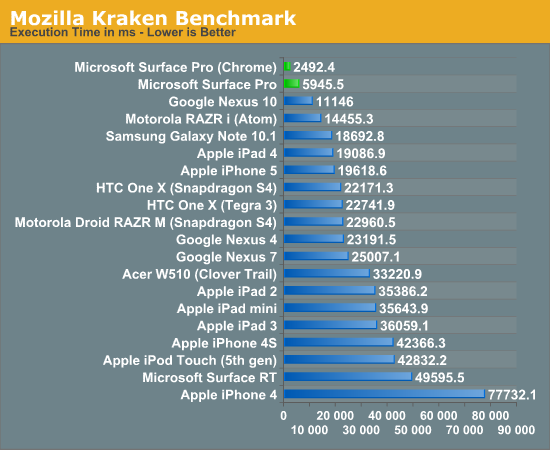
Even when handcuffed by modern IE10 you're looking at almost twice the performance of the Nexus 10. Level the playing field with Chrome as a browser and now Surface Pro completes the test in a bit more than 1/8 of the time of the iPad 4, or 1/4 of the time of the Nexus 10.
Surface Pro manages to deliver almost 5x the performance of the iPad 4 here.
We have one last web-based benchmark: WebXPRT by Principled Technologies (PT). WebXPRT measures performance in four HTML5/js workloads:
Photo Effects: Measures the time to apply effects to a set of six photos. The filters are Sharpen, Emboss, and Glow. WebXPRT applies each filter to two photos. This test uses HTML5 Canvas 2D and JavaScript.
Face Detect: Measures the average time to check for human faces in a photo. WebXPRT runs this test on five photos and uses the average time to calculate the final result. This test uses HTML5 Canvas 2D to get access to photo data. The detection algorithm is implemented in JavaScript.
Stocks Dashboard: Measures the time to calculate financial indicators of a stock based on historical data and display the result in a dashboard. The calculations are done in JavaScript, and the calculated stocks data is displayed using HTML tables and Canvas 2D.
Offline Notes: Measures the time to store notes securely in the browser's HTML5 local storage and display recent entries. This test uses using AES for security.
We're reporting the overall score after all tests have been run:
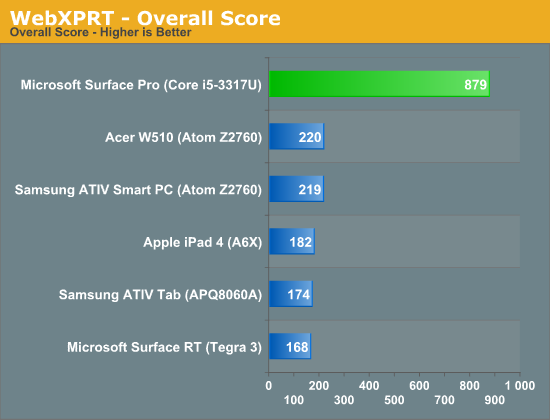
Next up are another set of benchmarks from PT, but unlike the WebXPRT suite these tests don't run in a browser. Once again we're looking at performance in a handful of tasks designed to stress the CPU. Here the performance advantage continues to be quite significant. While Surface RT and the other Windows RT/8 devices still feel a bit sluggish, I have no performance complaints whatsoever about Surface Pro:
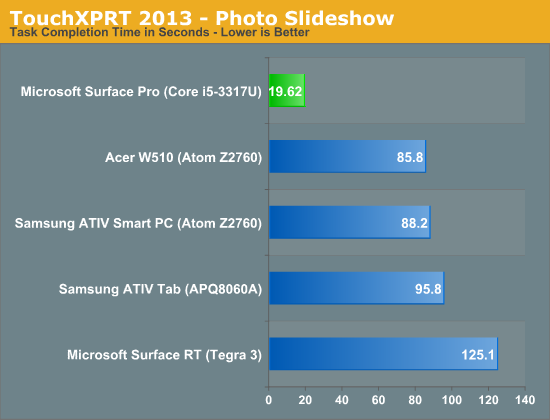
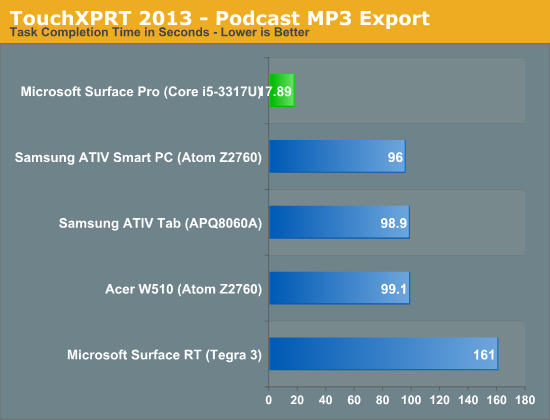
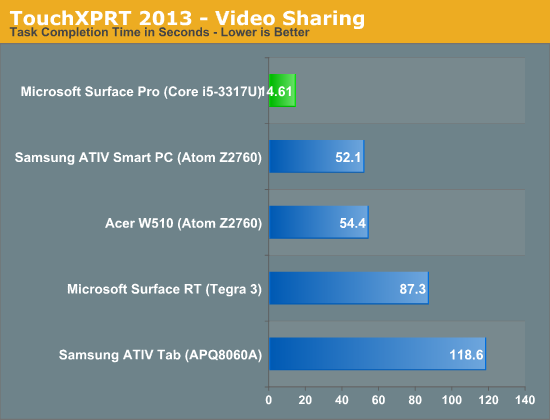
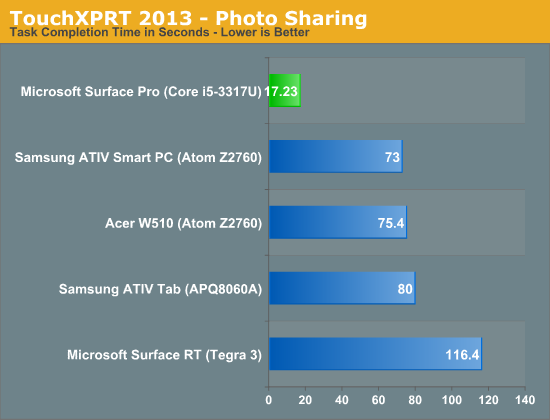
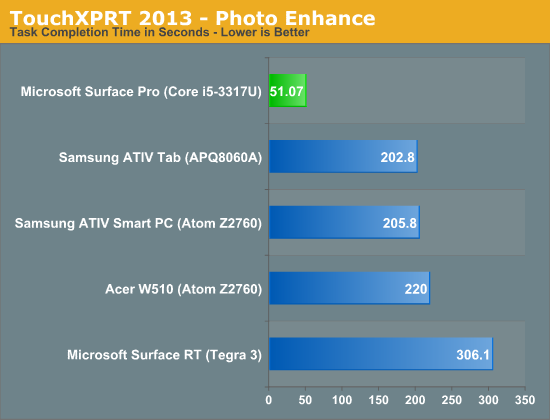
If I had any complaints about using Surface Pro as a tablet outside of weight, they’d be about Windows 8. There are still far too many bugs and quirks in the OS that just don’t make sense. I’ve outlined some of my issues with Windows 8 before. I think the UI works just fine for a tablet, it’s just the unfinished touches that need attention. For example, having to gesture in modern IE10 before being able to switch between tabs seems silly.
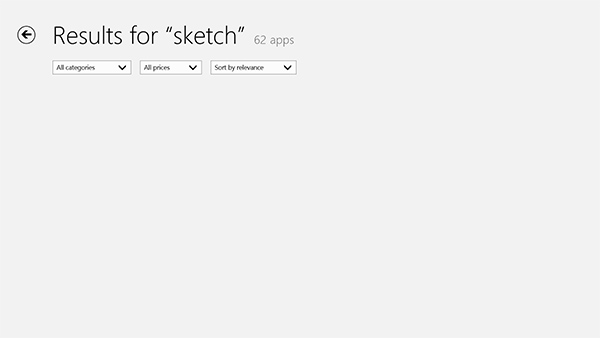
This still happens way too often in the Windows Store, no indication of what's going on just a blank screen
On the bug-front, all too often I’ll wake up the system only to have the lock screen upside down. And despite all of the extra performance under the hood, the time from when you hit the power/lock button to when something appears on the screen is just longer than on an iPad or Android tablet. We’re not talking several seconds, but it’s still noticeably longer.










228 Comments
View All Comments
kyuu - Friday, February 8, 2013 - link
I'm looking to get a mobile device with part of my tax return. I have zero interest in an iOS or Android tablet. What I'm looking at currently:1) Vizio's Hondo-based Tablet PC that was shown at CES.
2) Vizio's 2nd gen thin+lights, 14" model with touch screen and AMD A10
So basically, an ultrabook (thin+light) or a tablet are the only mobile devices I'm interested in. A normal laptop is too heavy and bulky for me to reguarly take with me out of the house. The Surface Pro would be in consideration, but the price is a little higher than I'm willing to spend (and should *really* include one of the covers).
atl - Wednesday, February 6, 2013 - link
42W 2 cell battery means 2 x 6 amps Li-ion cells (probably cut at 90% to increase cycles).As Li-ion charges from 0% to 70% at 1C, it requires 6amp charger.
Supplied charger just doubles the fast-charge period
kawatwo - Thursday, February 7, 2013 - link
Would like to see some Win 8 tablets with Core I3 and weight under 1.5 pounds. 2 pounds is a bit heavy for a tablet. Needs to include the Type keyboard as well. But overall what an awesome device. I'm sure other PC makers will get it right in the not real distant future.jeffkibuule - Friday, February 8, 2013 - link
Acer will have a newer version of the W700 with a 7W SDP Ivy Bridge chip that is 20% thinner than their current model (around 8mm), so it's certainly possible.phillyry - Saturday, February 16, 2013 - link
Graphics would blow on an i3 and make the touch based interface borderline unusable.Sabresiberian - Thursday, February 7, 2013 - link
I think Microsoft got into building their own hardware here because they felt forced to; no one was building the kind of quality device they wanted. I think Nokia and HTC need to step their games up too if they don't want a Microsoft phone to come along and take their business away (or relegate it to the cheap seats). I like this approach, and hope they do kick the phone industry on the pants, because none of them are what I'd really call "good". (I'm talking ALL smart phones, not just Win 8 phones - phones that really don't take much of a back seat to anything else on the market, overall.)THE one thing that kills the Surface for me is the 16:9 screen. that's okay for a tablet I suppose, but the Surface isn't about being "okay", and I think it's a slam in the face of a real quality experience. It puts the iPad out of the picture in every other way (in my opinion), but in this way, the iPad still pretty much kills everyone else.
Netscorer - Thursday, February 7, 2013 - link
Nobody else is building these because there is not enough demand. Microsoft can afford to chuck up all the costs that gone into Surface as marketing for Windows 8 OS, but if you are a typical PC manufacturer who operates on razor thin margins, you won't be able to afford to do what it takes to create an iPad killer. Add to this that neither Intel, nor Microsoft are giving you much of a slack on prices for core and Windows and that market for $1000+ laptops is already very small to begin with and you get the picture.SilthDraeth - Thursday, February 7, 2013 - link
I know it was a windows 7 tablet, but it to runs on a core i5 and 2gb of RAM. Have you guys never bench marked it, to include it in the graphs, in comparison to the newest?Silma - Thursday, February 7, 2013 - link
While it is perfectly clear to me that with a much bigger processor power consuption will be bigger than a way slower arm, hence it is to be expected that ultrabooks/surfaces can't have the same battery life as an iPad or nexus tablet, I don't understand the extreme différences seen in video playback benchmarks.On this benchmark I would of course expect Windows 8 offering to use a little more power than on an ios / android tablet due to the overhead of a bigger os, but here the différences are huge.
Here I think Microsoft and Intel could optimize greatly the power usage for 720p and 1080p mp4 playback.
andrewaggb - Thursday, February 7, 2013 - link
Agreed.